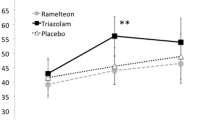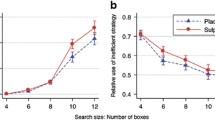Abstract
Objectives: Amisulpride is a benzamide antipsychotic that binds selectively to dopamine D2- and D3-receptors, preferentially in limbic and hippocampal structures. Since other substituted benzamides have a limited or negligible interaction with alcohol on human performance, amisulpride was studied for this potential.
Methods:
In a randomised double-blind crossover study, 18 young, non-smoking men took single oral doses of placebo and amisulpride 50 mg and 200 mg, without and with ethanol (0.8 g ⋅kg−1) taken 30 min later. Objective performance tests and self-ratings were done at baseline and 1.5, 3.5 and 6.5 h after drug intake. Memory (immediate and delayed recall) was tested 2 h after dosing. Breath ethanol and the plasma concentrations of amisulpride and prolactin were measured. Three-way ANOVA + Newman-Keul tests were used for statistical analyses; interactions were confirmed by factorial contrast ANOVA.
Results:
Mean blood ethanol was 0.94, 0.62 and 0.26 g ⋅l−1 at the three test times. It produced significant impairment in all performance tests (symbol digit substitution, simulated driving, body sway, flicker fusion, tapping, nystagmus), reduced both immediate and delayed recall in memory tests, and caused subjective clumsiness, muzziness and mental slowness, mainly between 1.5 to 4.5 h after dosing. Amisulpride, 50 and 200 mg elevated plasma prolactin but had minimal or no effect on performance, attention and memory. The decreases in immediate free recall after the 50 mg dose and in delayed free recall after the 200 mg dose were slight. Amisulpride neither modified blood ethanol concentrations nor enhanced the detrimental effect of ethanol on skilled and cognitive performance; it slightly antagonised ethanol in the digit copying test. Ethanol did not modify the effect of amisulpride on plasma prolactin, and the plasma concentrations of amisulpride were little changed by ethanol.
Conclusions:
Amisulpride in single oral doses of 50 and 200 mg did not interact significantly with the effects of high, moderate or low concentrations of ethanol on human skilled and cognitive performance. The drugs did interact pharmacokinetically.
Similar content being viewed by others
Author information
Authors and Affiliations
Additional information
Received: 22 December 1995/Accepted in revised form: 1 April 1996
Rights and permissions
About this article
Cite this article
Mattila, M., Patat, A., Seppälä, T. et al. Single oral doses of amisulpride do not enhance the effects of alcohol on the performance and memory of healthy subjects. E J Clin Pharmacol 51, 161–166 (1996). https://doi.org/10.1007/s002280050178
Issue Date:
DOI: https://doi.org/10.1007/s002280050178




